Unit 9 Have you ever been to a museum? Section A 3a-3c 课件 (共23张PPT)2023-2024学年人教版英语八年级下册
文档属性
| 名称 | Unit 9 Have you ever been to a museum? Section A 3a-3c 课件 (共23张PPT)2023-2024学年人教版英语八年级下册 | 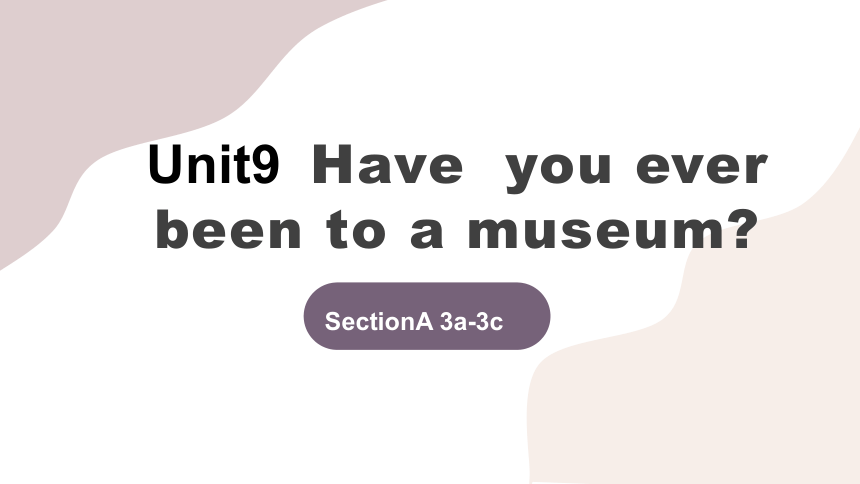 | |
| 格式 | pptx | ||
| 文件大小 | 6.6MB | ||
| 资源类型 | 教案 | ||
| 版本资源 | 人教新目标(Go for it)版 | ||
| 科目 | 英语 | ||
| 更新时间 | 2024-05-16 22:28:32 | ||
图片预览

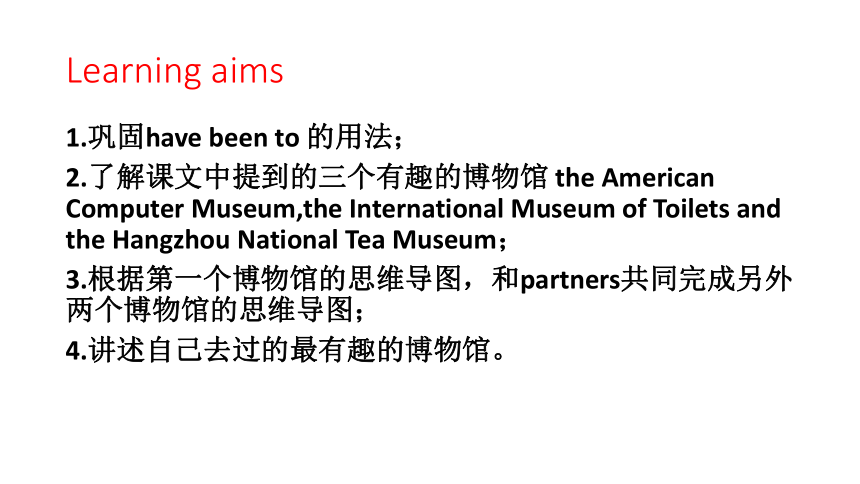
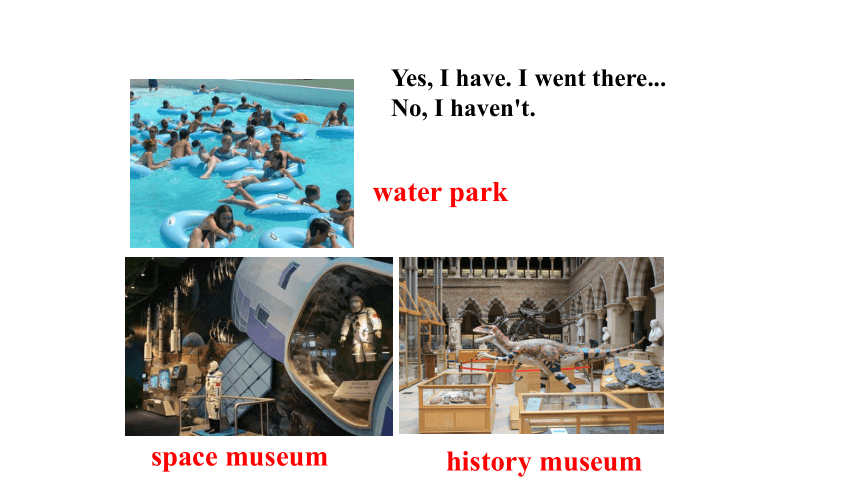
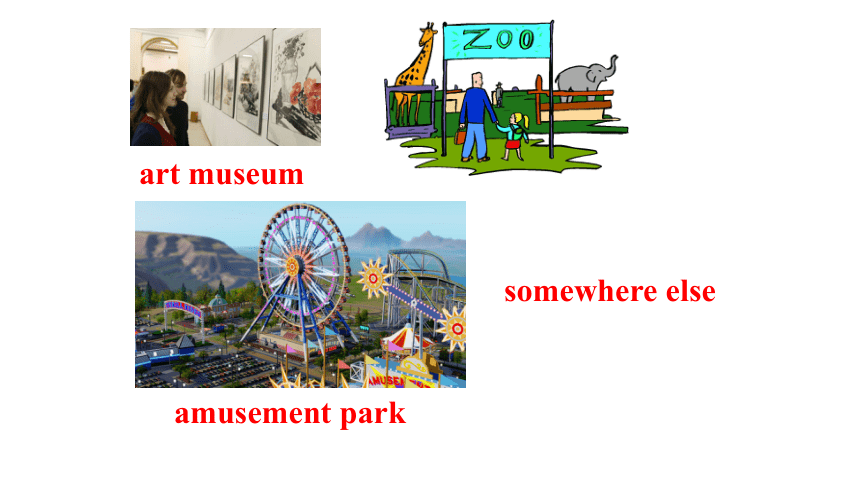
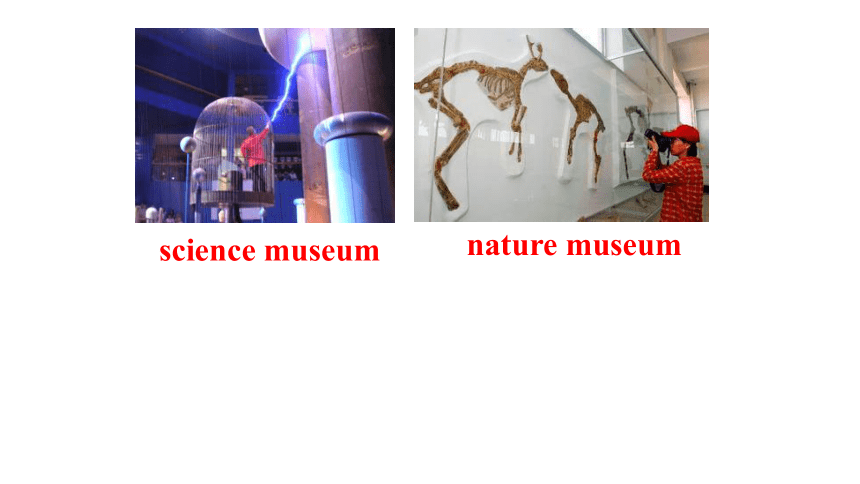
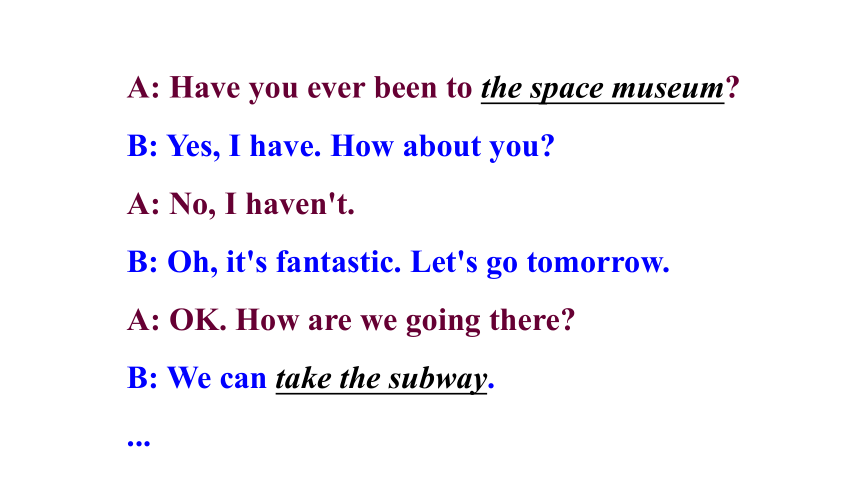
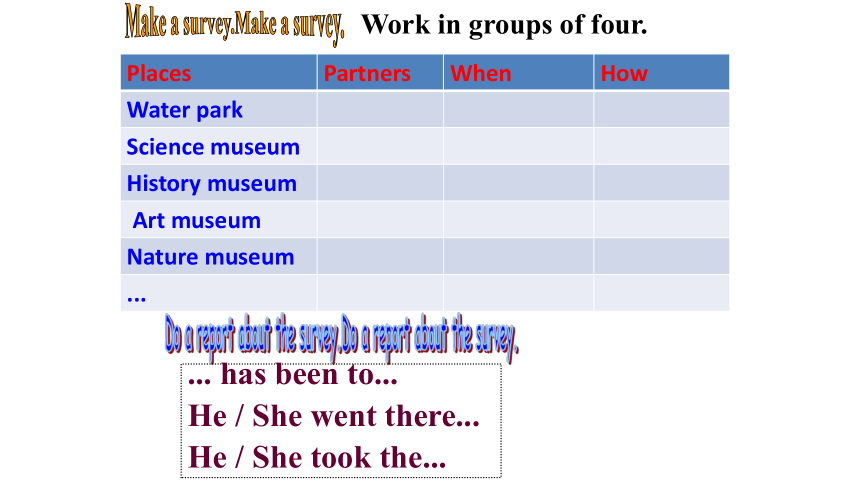
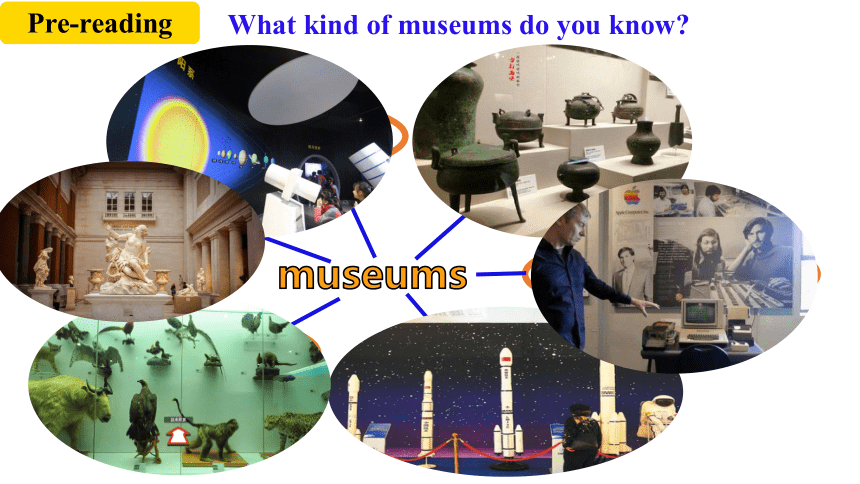
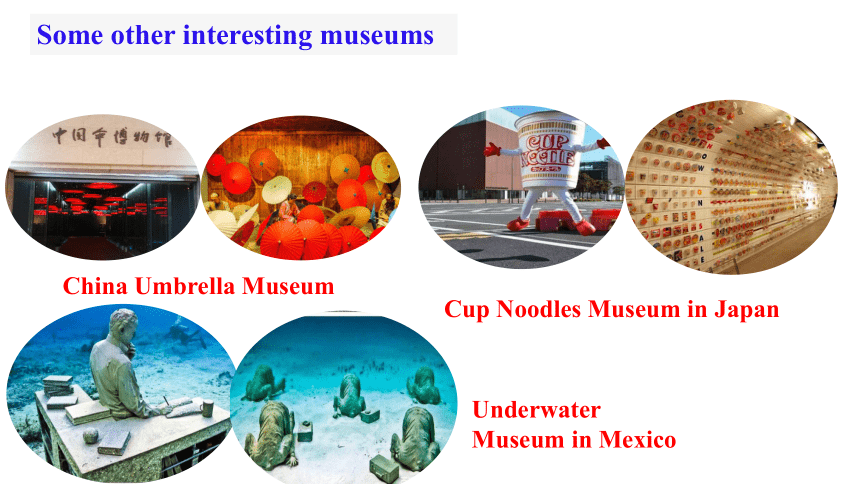
文档简介
(共23张PPT)
Unit9 Have you ever been to a museum
SectionA 3a-3c
Learning aims
1.巩固have been to 的用法;
2.了解课文中提到的三个有趣的博物馆 the American Computer Museum,the International Museum of Toilets and the Hangzhou National Tea Museum;
3.根据第一个博物馆的思维导图,和partners共同完成另外两个博物馆的思维导图;
4.讲述自己去过的最有趣的博物馆。
Have you ever been to... Have you ever been to...
Yes, I have. I went there...
No, I haven't.
space museum
history museum
water park
art museum
amusement park
somewhere else
science museum
nature museum
A: Have you ever been to the space museum
B: Yes, I have. How about you
A: No, I haven't.
B: Oh, it's fantastic. Let's go tomorrow.
A: OK. How are we going there
B: We can take the subway.
...
Work in groups of four.
Make a survey.Make a survey.
Places Partners When How
Water park
Science museum
History museum
Art museum
Nature museum
...
Do a report about the survey.Do a report about the survey.
... has been to...
He / She went there...
He / She took the...
museums
science museum
nature museum
history museum
space museum
computer museum
art museum
What kind of museums do you know
Pre-reading
Some other interesting museums
China Umbrella Museum
Cup Noodles Museum in Japan
Underwater Museum in Mexico
museums
science museum
nature museum
history museum
space museum
computer museum
art museum
Pre-reading
A: Have you ever been to …
B: Yes, I have. I have been to ...
/ No, I haven’t. I have never been to ...
China Umbrella Museum
Underwater Museum in Mexico
1.Which museum do not the students talk about
2.What can’t we learn at the International Museum of Toilets
3.What does Ken say about the American Computer Museum
Read the article and answer the following questions.
While-reading
1.fast reading
3a
Read the magazine article and answer the questions
1. Which three museums do the students talk about
They talk about the American Computer Museum, the International Museum of Toilets and Hangzhou National Tea Museum.
2. What do you think is the most interesting thing about each museum
the American Computer Museum—the special computer that can play chess even better than humans.
the International Museum of Toilets—many different kinds of toilets.
the Hangzhou National Tea Museum—the tea art performances.
3b
Read the article again and answer the following questions.
1. What does Ken say about the American Computer Museum
Ken says that:
(a) It is the most interesting museum he has ever been to.
(b) It has information about different computers and who invented them.
(c) He learned that there was a special computer that plays chess better than humans.
2. What can we learn at the International Museum of Toilets
3. Why is the Hangzhou National Tea Museum a nice place to
enjoy tea
We can learn about the history and development of toilets.
It is a nice place to enjoy tea because it is a relaxing and peaceful place near a lake. Watching tea art performances is also enjoyable.
3c
Which of the underlined words in the passage have the following meanings
progress
rapid
unusual
peaceful
improve
invented
make sth. better
become better
uncommon
quiet
made
quick
1.Which museum do not the students talk about
A. the American Computer Museum B. the International Museum of Toilets
C. the Louvre[ lu v ] D.the Hangzhou National Tea Museum
2.What can’t we learn at the International Museum of Toilets
A.How will the future toilets develop
B.The development of toilets.
C.The history of toilets.
D.There are so many kinds of toilets.
C
While-reading
A
develop v.发展,培养 ~ed ~ed
development n.发展,成长,开发
with the ~of 随着...的发展
3.What does Ken say about the American Computer Museum
A. The older computer was smaller than today’s.
B. The technology these days has progressed a lot.
C. It couldn’t play chess better than humans.
D. This museum is boring.
B
un.[ pr ɡres]进步,进展 make ~
vi.[pr ɡres]进步,进展 ~ed ~ed
一、 根据句意及汉语提示,完成句中所缺的单词。
1. It was the study of history that gave birth to the social (社会的) science.
2. — What do you plan to do this weekend?
— We want to visit the toilet (厕所) museum.
social
toilet
3. It is science and technology that connect progress (进步) with the future of humans.
4. He finished doing his homework in such a rapid (快速的) way.
progress
rapid
一
二
三
四
五
六
二、 用所给单词的适当形式填空。
1. She is the girl whose invention (invent) got first prize in the school competition.
2. The teachers encourage (courage) their students to work out the problems by themselves, and in this way students can enjoy success.
3. The wounded horse could not raise itself (it) from the ground.
4. Many old men prefer to live in the peaceful (peace) countryside.
invention
encourage
itself
peaceful
一
二
三
四
五
六
三、 用方框中所给单词或短语的适当形式填空。
progress collect perfect relax be able to
1. I think robots will be able to do most jobs for people in the future.
2. It’s relaxing to listen to light music when you feel tired.
3. The teacher says science and technology have progressed in a rapid way so far.
4. Every Saturday, the poor boy collects the rubbish and then goes to sell it.
5. She speaks perfect English. She tells me she wants to be an English teacher.
will be able to
relaxing
have progressed
collects
perfect
一
二
三
四
五
六
四、 根据汉语提示完成句子,每空一词。
1. 老师鼓励他说话大声一点儿。
The teacher encouraged him to speak a little louder.
2. 他们先品了茶,然后开心地观看了茶艺表演。They tasted tea first and then watched the tea art performances happily.
3. 令人惊讶的是,5G技术正在以如此快速的方式发展!It’s amazing that 5G technology is developing in such a rapid way .
4. 我爷爷喜欢收集茶具。
My grandfather likes collecting tea sets .
encouraged
to
speak
tea
art
performances
in
such
a
rapid
way
collecting
tea
sets
一
二
三
四
五
六
44. — Excuse me, could you tell me where the toilet is? — It’s over there.
45. If you find anything unusual , please tell your teacher at once.
toilet
unusual
一
二
三
四
五
六
七
Unit9 Have you ever been to a museum
SectionA 3a-3c
Learning aims
1.巩固have been to 的用法;
2.了解课文中提到的三个有趣的博物馆 the American Computer Museum,the International Museum of Toilets and the Hangzhou National Tea Museum;
3.根据第一个博物馆的思维导图,和partners共同完成另外两个博物馆的思维导图;
4.讲述自己去过的最有趣的博物馆。
Have you ever been to... Have you ever been to...
Yes, I have. I went there...
No, I haven't.
space museum
history museum
water park
art museum
amusement park
somewhere else
science museum
nature museum
A: Have you ever been to the space museum
B: Yes, I have. How about you
A: No, I haven't.
B: Oh, it's fantastic. Let's go tomorrow.
A: OK. How are we going there
B: We can take the subway.
...
Work in groups of four.
Make a survey.Make a survey.
Places Partners When How
Water park
Science museum
History museum
Art museum
Nature museum
...
Do a report about the survey.Do a report about the survey.
... has been to...
He / She went there...
He / She took the...
museums
science museum
nature museum
history museum
space museum
computer museum
art museum
What kind of museums do you know
Pre-reading
Some other interesting museums
China Umbrella Museum
Cup Noodles Museum in Japan
Underwater Museum in Mexico
museums
science museum
nature museum
history museum
space museum
computer museum
art museum
Pre-reading
A: Have you ever been to …
B: Yes, I have. I have been to ...
/ No, I haven’t. I have never been to ...
China Umbrella Museum
Underwater Museum in Mexico
1.Which museum do not the students talk about
2.What can’t we learn at the International Museum of Toilets
3.What does Ken say about the American Computer Museum
Read the article and answer the following questions.
While-reading
1.fast reading
3a
Read the magazine article and answer the questions
1. Which three museums do the students talk about
They talk about the American Computer Museum, the International Museum of Toilets and Hangzhou National Tea Museum.
2. What do you think is the most interesting thing about each museum
the American Computer Museum—the special computer that can play chess even better than humans.
the International Museum of Toilets—many different kinds of toilets.
the Hangzhou National Tea Museum—the tea art performances.
3b
Read the article again and answer the following questions.
1. What does Ken say about the American Computer Museum
Ken says that:
(a) It is the most interesting museum he has ever been to.
(b) It has information about different computers and who invented them.
(c) He learned that there was a special computer that plays chess better than humans.
2. What can we learn at the International Museum of Toilets
3. Why is the Hangzhou National Tea Museum a nice place to
enjoy tea
We can learn about the history and development of toilets.
It is a nice place to enjoy tea because it is a relaxing and peaceful place near a lake. Watching tea art performances is also enjoyable.
3c
Which of the underlined words in the passage have the following meanings
progress
rapid
unusual
peaceful
improve
invented
make sth. better
become better
uncommon
quiet
made
quick
1.Which museum do not the students talk about
A. the American Computer Museum B. the International Museum of Toilets
C. the Louvre[ lu v ] D.the Hangzhou National Tea Museum
2.What can’t we learn at the International Museum of Toilets
A.How will the future toilets develop
B.The development of toilets.
C.The history of toilets.
D.There are so many kinds of toilets.
C
While-reading
A
develop v.发展,培养 ~ed ~ed
development n.发展,成长,开发
with the ~of 随着...的发展
3.What does Ken say about the American Computer Museum
A. The older computer was smaller than today’s.
B. The technology these days has progressed a lot.
C. It couldn’t play chess better than humans.
D. This museum is boring.
B
un.[ pr ɡres]进步,进展 make ~
vi.[pr ɡres]进步,进展 ~ed ~ed
一、 根据句意及汉语提示,完成句中所缺的单词。
1. It was the study of history that gave birth to the social (社会的) science.
2. — What do you plan to do this weekend?
— We want to visit the toilet (厕所) museum.
social
toilet
3. It is science and technology that connect progress (进步) with the future of humans.
4. He finished doing his homework in such a rapid (快速的) way.
progress
rapid
一
二
三
四
五
六
二、 用所给单词的适当形式填空。
1. She is the girl whose invention (invent) got first prize in the school competition.
2. The teachers encourage (courage) their students to work out the problems by themselves, and in this way students can enjoy success.
3. The wounded horse could not raise itself (it) from the ground.
4. Many old men prefer to live in the peaceful (peace) countryside.
invention
encourage
itself
peaceful
一
二
三
四
五
六
三、 用方框中所给单词或短语的适当形式填空。
progress collect perfect relax be able to
1. I think robots will be able to do most jobs for people in the future.
2. It’s relaxing to listen to light music when you feel tired.
3. The teacher says science and technology have progressed in a rapid way so far.
4. Every Saturday, the poor boy collects the rubbish and then goes to sell it.
5. She speaks perfect English. She tells me she wants to be an English teacher.
will be able to
relaxing
have progressed
collects
perfect
一
二
三
四
五
六
四、 根据汉语提示完成句子,每空一词。
1. 老师鼓励他说话大声一点儿。
The teacher encouraged him to speak a little louder.
2. 他们先品了茶,然后开心地观看了茶艺表演。They tasted tea first and then watched the tea art performances happily.
3. 令人惊讶的是,5G技术正在以如此快速的方式发展!It’s amazing that 5G technology is developing in such a rapid way .
4. 我爷爷喜欢收集茶具。
My grandfather likes collecting tea sets .
encouraged
to
speak
tea
art
performances
in
such
a
rapid
way
collecting
tea
sets
一
二
三
四
五
六
44. — Excuse me, could you tell me where the toilet is? — It’s over there.
45. If you find anything unusual , please tell your teacher at once.
toilet
unusual
一
二
三
四
五
六
七
同课章节目录
- Unit 1 What's the matter?
- Section A
- Section B
- Unit 2 I'll help to clean up the city parks.
- Section A
- Section B
- Unit 3 Could you please clean your room?
- Section A
- Section B
- Unit 4 Why don't you talk to your parents?
- Section A
- Section B
- Unit 5 What were you doing when the rainstorm came
- Section A
- Section B
- Review of Units 1-5
- Unit 6 An old man tried to move the mountains.
- Section A
- Section B
- Unit 7 What's the highest mountain in the world?
- Section A
- Section B
- Unit 8 Have you read Treasure Island yet?
- Section A
- Section B
- Unit 9 Have you ever been to a museum?
- Section A
- Section B
- Unit 10 I've had this bike for three years.
- Section A
- Section B
